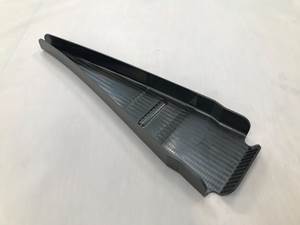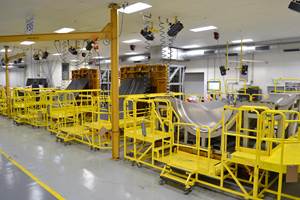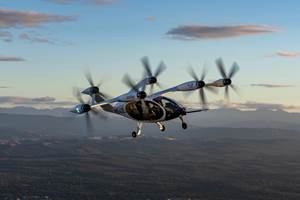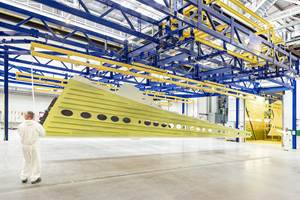Toray wins carbon fiber supply contract for Boeing 777X composite wings
Tokyo-based Toray, the world's largest manufacturer of carbon fiber, will expand its current contract for the Boeing 787 Dreamliner to include the 777X composite wings.
The Boeing Co. (Everett, Wash., USA) reported on Nov. 16 that it has signed a memorandum of agreement with carbon fiber manufacturer Toray Industries (Tokyo, Japan) to expand its current contract for the Boeing 787 Dreamliner to include the 777X wings. Once finalized, the long-term contract extension will take effect in 2015 and meet Boeing's customer affordability goals through the Partnering for Success program.
The addition of the 777X to the current 787 contract represents a significant increase in the material provided to Boeing by Toray. Boeing and Toray will also collaborate to improve commercialization of composite materials in the aerospace market. Specific areas the companies will address include increased consistency and performance of composite materials across the production system and a cost structure that is more competitive with metals.
"This partnership is a great example of why Toray is the market leader in composite materials," says John Tracy, Boeing chief technology officer and senior vice president for Engineering, Operations & Technology. "Their understanding of the technology is outstanding, but they also know there is much more we can do with composites in aerospace if we work together to improve the performance, processing and economics. Toray is working with us on that and we are happy to expand their work statement to include the 777X."
Boeing and Toray pioneered the use of prepreg composites in the 1970s. By 1994, assemblies including the empennage and floor beams were being produced for the 777 program, the first commercial airplane featuring structurally significant composite parts. That early success culminated in the launch of the 787 in 2004, the world's first largely composite commercial airplane.
"We believe that this agreement signifies the solid mutual trust Toray has been building with Boeing through the stable supply of high quality carbon fiber materials since the 1970s," says Akihiro Nikkaku, president, Toray Industries. "It also reflects Boeing's recognition of our world-class technology and firm commitments to expanding composites application to aircraft. Going forward, Toray will continue to duly enhance its supply capacity in line with the production increases planned by Boeing."
"Boeing has partnered with the Japanese aerospace industry for nearly five decades," says George Maffeo, president, Boeing Japan. "Their work encompasses the development and introduction of all current Boeing programs: the Next-Generation 737, 737 MAX, 747, 767, 777 and 787 Dreamliner. The consistent performance of our Japanese partners and their enduring effort and dedication, as exemplified today by Toray, has helped Boeing achieve tremendous success with our products. We couldn't be more delighted to continue that legacy with the 777X."
With this agreement, Boeing will have contracts in place for more than 75 percent of the major structural material for the 777X. The wingspan of the 777X measures 71.7m/235.4 ft, 6.95m/22.8 ft longer than the span of today's 777-300ER. Its raked wingtip and optimized span are designed to deliver greater efficiency and significant fuel savings while being compatible with today's airport gates. The 777X wings will be manufactured at Boeing's Everett, Wash., site.
In 2013, Boeing spent more than $4 billion on goods and services in Japan. Including this agreement for the 777X composite wing, Boeing expects to purchase an additional $36 billion of goods and services locally by the end of the decade, supporting tens of thousands of aerospace jobs.
Related Content
ASCEND program update: Designing next-gen, high-rate auto and aerospace composites
GKN Aerospace, McLaren Automotive and U.K.-based partners share goals and progress aiming at high-rate, Industry 4.0-enabled, sustainable materials and processes.
Read MorePlant tour: Middle River Aerostructure Systems, Baltimore, Md., U.S.
The historic Martin Aircraft factory is advancing digitized automation for more sustainable production of composite aerostructures.
Read MorePlant tour: Joby Aviation, Marina, Calif., U.S.
As the advanced air mobility market begins to take shape, market leader Joby Aviation works to industrialize composites manufacturing for its first-generation, composites-intensive, all-electric air taxi.
Read MorePlant tour: Spirit AeroSystems, Belfast, Northern Ireland, U.K.
Purpose-built facility employs resin transfer infusion (RTI) and assembly technology to manufacture today’s composite A220 wings, and prepares for future new programs and production ramp-ups.
Read MoreRead Next
Plant tour: Daher Shap’in TechCenter and composites production plant, Saint-Aignan-de-Grandlieu, France
Co-located R&D and production advance OOA thermosets, thermoplastics, welding, recycling and digital technologies for faster processing and certification of lighter, more sustainable composites.
Read More“Structured air” TPS safeguards composite structures
Powered by an 85% air/15% pure polyimide aerogel, Blueshift’s novel material system protects structures during transient thermal events from -200°C to beyond 2400°C for rockets, battery boxes and more.
Read MoreAll-recycled, needle-punched nonwoven CFRP slashes carbon footprint of Formula 2 seat
Dallara and Tenowo collaborate to produce a race-ready Formula 2 seat using recycled carbon fiber, reducing CO2 emissions by 97.5% compared to virgin materials.
Read More

























